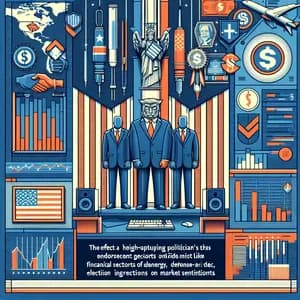Judicial Nominations: Game Changer for Financial Markets?

Article: Political Nominees and Their Potential Impact on Financial Markets
In recent posts on Truth Social, former President Donald Trump has announced judicial nominations that could have significant implications for the financial markets. Specifically, the nominations of Rebecca Taibleson to the United States Court of Appeals for the Seventh Circuit and Edmund LaCour to the Northern District of Alabama highlight the ongoing influence of judicial appointments on economic policy and regulatory environments.
Analyzing the Impact of Judicial Appointments
Judicial appointments are crucial as they shape the legal landscape in which businesses operate. Courts play a vital role in interpreting regulations, protecting intellectual property, and adjudicating contracts. The nominees' legal philosophies can directly affect policies that either promote or hinder business growth.
- Rebecca Taibleson’s Nomination: As a former Assistant United States Attorney and a clerk for Supreme Court Justices, Taibleson's background suggests she may support pro-business rulings that encourage economic growth. If confirmed, her decisions could favor corporate interests, particularly in areas involving regulatory compliance and business litigation. Companies like Amazon ($AMZN) and Apple ($AAPL), which often find themselves in legal disputes regarding regulatory practices, might benefit from a judiciary that leans towards business-friendly interpretations.
- Edmund LaCour’s Nomination: LaCour has a strong record as Solicitor General of Alabama, where he has represented the state in pivotal cases. His views on issues like taxation and state regulations could influence how companies operate within Alabama and the broader Southeast region. For firms like Alabama Power Company ($SO) and Regions Financial Corporation ($RF), LaCour's confirmation could signal a more favorable regulatory environment, promoting business expansion and investment.
Broader Implications for the Market
The implications of these nominations extend beyond individual companies. The potential for a judiciary that favors businesses may lead to increased investor confidence, encouraging capital inflow into the markets. When businesses feel secure in their legal standing, they are more likely to invest in growth initiatives, leading to job creation and, ultimately, a positive impact on the economy as a whole.
Investors should also consider sectors that may see a direct impact from these judicial decisions. The technology sector, represented by giants like Microsoft ($MSFT), may benefit from rulings that protect intellectual property rights, fostering innovation and competition. Similarly, industries reliant on strong regulatory frameworks, such as pharmaceuticals and financial services, could see increased stability and growth under favorable judicial interpretations.
Conclusion
As the political landscape continues to evolve, the implications of judicial nominations such as those of Taibleson and LaCour cannot be overlooked. Investors should keep a close eye on how these appointments unfold and consider their potential impact on market conditions and specific sectors. The interplay between judicial decisions and business operations will undeniably shape the investment landscape in the coming years.
For further insights and updates on these nominations and their potential market impact, you can read more here: Rebecca Taibleson Nomination, Edmund LaCour Nomination.




